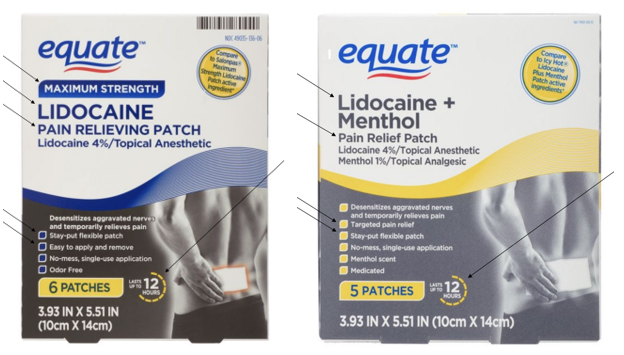Walmart’s Equate Lidocaine Patches Peel Off Well Before Advertised 12 Hours, Class Action Alleges
by Erin Shaak
Rodriguez v. Walmart Inc.
Filed: April 11, 2022 ◆§ 1:22-cv-02991
A lawsuit claims Walmart deceptively advertised its Equate lidocaine patches as able to provide a “maximum strength” dose of the anesthetic for “up to 12 hours.”
New York
A proposed class action lawsuit claims that Walmart has deceptively advertised its Equate-brand lidocaine pain-relieving patches as able to provide a “maximum strength” dose of the anesthetic for “up to 12 hours.”
According to the 30-page suit, this representation is false given the patches frequently peel off the wearer’s skin shortly after application and contain less lidocaine than comparable products on the market.

The lawsuit alleges consumers have been injured financially by paying more for the products—including the Equate Maximum Strength Lidocaine Pain Relieving Patch and Equate Lidocaine + Menthol Pain Relief Patch—than they would have absent Walmart’s deceptive representations.
“Given that Plaintiff and Class Members paid a premium for Products based on Defendant’s misrepresentations that the Products provide ‘pain relieving/pain relief,’ that is ‘maximum strength,’ through an ‘easy to apply,’ and ‘stay-put, flexible patch’ that will last ‘up to 12 hours,’ Plaintiff and Class Members suffered an injury in the amount of the premium paid,” the complaint charges.
Per the case, lidocaine patches such as the Equate products, which deliver a topical dosage of the anesthetic to help alleviate pain, have been shown to “systemically fail” to adhere to a person’s skin and thus do not provide the advertised pain relief. The complaint cites a 2021 study in the Journal of Pain Research that found that no generic prescription lidocaine patches had a greater than 90-percent adhesion rate after 12 hours, and that the average adhesion rate after 12 hours was 37.67 percent, based on a scale in which zero percent reflects total detachment and 50 percent reflects half the patch lifting off the skin.
According to the complaint, Walmart’s Equate lidocaine patches are no different and frequently peel off a wearer’s skin well before the represented 12 hours of pain relief the products are promised to provide.
The lawsuit goes on to claim that Walmart’s representation that its Equate patches are “maximum strength” is also false given the products contain only four-percent lidocaine, and competitor prescription patches contain as much as five percent lidocaine. The suit argues that consumers expect a product represented as “maximum strength” to deliver the highest dose available among competitor products on the market.
“Thus, Defendant deceives reasonable consumers, like Plaintiff, into believing that they are purchasing the patch with the most lidocaine when there are other competitor prescription products available in the market that contain a higher dose of lidocaine,” the complaint reads.
The lawsuit looks to represent anyone who purchased the Equate lidocaine patches mentioned on this page anywhere in the U.S. within the applicable statute of limitations period.
Get class action lawsuit news sent to your inbox – sign up for ClassAction.org’s newsletter here.
Video Game Addiction Lawsuits
If your child suffers from video game addiction — including Fortnite addiction or Roblox addiction — you may be able to take legal action. Gamers 18 to 22 may also qualify.
Learn more:Video Game Addiction Lawsuit
Depo-Provera Lawsuits
Anyone who received Depo-Provera or Depo-Provera SubQ injections and has been diagnosed with meningioma, a type of brain tumor, may be able to take legal action.
Read more: Depo-Provera Lawsuit
How Do I Join a Class Action Lawsuit?
Did you know there's usually nothing you need to do to join, sign up for, or add your name to new class action lawsuits when they're initially filed?
Read more here: How Do I Join a Class Action Lawsuit?
Stay Current
Sign Up For
Our Newsletter
New cases and investigations, settlement deadlines, and news straight to your inbox.
Before commenting, please review our comment policy.